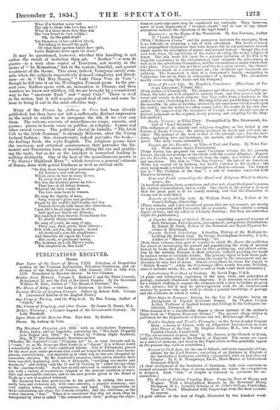Many of the Poems by Aubrey de Very had been
already published, but they have not left a sufficiently distinct impression
on the mind to enable us to recognize the old, if we ever saw them. The volume consists of miscellaneous songs, sonnets, and poems ; pieces in heroic verse on politics or religion; hymns and other sacred verses. The political cheval de bataille, "The Irish
Celt to the Irish Norman," is strongly Milesian, after the Young Ireland fashion : this characteristic indeed pervades the book,—
the feelings Irish, the style English. The religious poems have the unctuous and artistical sensuousness that pervades the Ro- manist and Tractarian form of worship, filling the eye and gratify- ing the taste, but so far as the intellect is concerned leading to nothing distinctly. One of the best of the miscellaneous poems is "To Burns's Highland Mary " ; which involves a general estimate of Burns, done with genial kindness as well as critical skill.
"In him there burned that passionate glow, All Nature's soul and savour, Which gives its hue to every flower, To every fruit its flavour.
Nor less the kindred power he felt— That love of all things human, Whereof the fiery centre is The love man bears to woman.
He sang the dignity of man, Sang woman's grace and goodness ; Passed by the world's half-truths, her lies Pierced through with lance-like shrewdness.
Upon life's broad highways he stood, And aped nor Greek nor Roman ; But snatched from heaven Promethean fire To glorify things common.
He sang of youth, he sang of age,
Their joys, their griefs, their labours ; Felt with, not for, the people ; hailed
All Scotland's sons his neighbours: And therefore all repeat his verse—
Hot youth, or greybeard steady, The boatman on Loch Etive's wave, The shepherd on Ben Ledi."


































 Previous page
Previous page